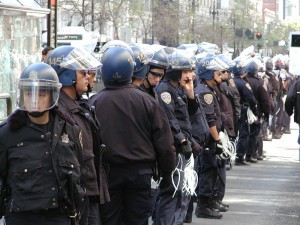Being a police officer in Ferguson, Missouri right now is surely not an easy or desired job.
As the country continues to speculate on the death of teenager Michael Brown, many have condemned the Ferguson Police Department and Officer Darren Wilson, the officer who allegedly fired the shots that killed Brown. Some say the officer abused his power and that the shooting was racially motivated. Of course, this is a country where the public has shown time and time again that waiting to hear the facts is not a priority, and judgements are swiftly made solely on nothing more than raw emotions. So often with cases like these the truth comes out weeks or months later and is diametrically opposed to the original stories written in the press.
The latest report out of Ferguson is that Officer Wilson was badly beaten before the shooting occurred and apparently suffered a shattered eye orbital after allegedly being punched in the face Brown. These facts will surely play a key role in court, helping to determine whether or not the shooting was justified.
With so much drama and public outrage, the Ferguson police department is already openly speculating on taking a step that other police departments across the country and the world have made — to purchase body worn cameras.
The situation in Ferguson is a perfect example of how crucially valuable these devices could be to both the officers and the public alike — bottom line, if there is a video record of an officers interactions while responding to a call, then there is significantly less debate about what did or didn’t occur. Proponents of this technological trend claim that an important purpose for these devices is to save money on court costs and lawsuits that almost always follow police use of force situations, savings which have statistically been proven true.
This trend of “guilty until proven innocent” mindset that is seemingly always associated with incidents involving police officer use of force is disturbing. We rely so heavily (whether we recognize it or not) on the police. After all, if anything were to ever happen to you in which you feared for your life or the lives of others, what’s the first thing you’re going to do? You’re going to call 9-1-1, because you know that calling 9-1-1 means that, whatever situation you’re in, an officer will jump in his car and speed off to help you — and bring his gun.
Yet, at the very whiff of an officer-related shooting, we immediately condemn the officer and sympathize with the victim, regardless of the circumstances or facts related to the incident. When looking at it objectively and in retrospect for countless cases, it’s as illogical as it is unfortunate that we do this over and over again.
If the Ferguson Police Department does indeed equip their officers with body worn cameras, it will undoubtedly strengthen other police department’s plans to do so. And safe to say, it won’t be long before all police officers — from New Jersey to San Diego — wear these devices.
